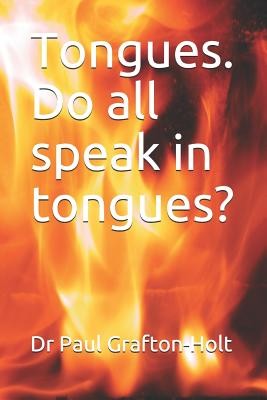
- We will send in 10–14 business days.
- Author: Paul Grafton-Holt
- Publisher: INDEPENDENTLY PUBLISHED
- ISBN-10: 1077405715
- ISBN-13: 9781077405714
- Format: 15.2 x 22.9 x 0.6 cm, softcover
- Language: English
- SAVE -10% with code: EXTRA
Reviews
Description
Pentecostalism maintains that the initial evidence of a born-again believer is that he or she immediately speaks in tongues, just as the hundred-and-twenty did when Jesus breathed His Spirit upon them at Pentecost (Acts 2:1-13). Indeed Casanova said: 'One of the most publicized features of the Pentecostalism movement is the church's belief in speaking in tongues and in divine gifts, such as healing. Speaking in tongues is thought to be an outcome of baptism through the Holy Spirit. The church believes in the gift of speaking in tongues, both glossolalia (speech in an unknown language) and xenoglossy (speech in a language known but not to speaker)'. If this is an accurate rendering of the salvific process then it means that those who do not immediately manifest glossolalia have not experienced a true conversion and are not therefore the children of God. From a Christian believer's perspective, this is a matter of extreme importance, as holding the right doctrine on this issue is literally a matter of life or death. If Pentecostalism is correct, Scripture will confirm that those converted to faith in Christ underwent glossolalia on each and every occasion. And indeed, one would expect Jesus and His disciples to comment upon the matter, given its fundamental importance in the conversion process. If, however, Scripture does not confirm this unequivocally then the notion cannot be correct and can be discarded as a consequence of it being an unjustifiable hermeneutic, peculiar to certain sections of the Pentecostal and charismatic churches. This book will examine the evidence, or lack thereof, in support of the Pentecostal and charismatic churches claim that the initial evidence of a born-again believer is his or her breaking forth in glossolalia at the point of conversion to see if this is a sustainable hermeneutic as they espouse or if instead they have taken certain texts out of context to establish a pretext for this belief.
- Author: Paul Grafton-Holt
- Publisher: INDEPENDENTLY PUBLISHED
- ISBN-10: 1077405715
- ISBN-13: 9781077405714
- Format: 15.2 x 22.9 x 0.6 cm, softcover
- Language: English English
Pentecostalism maintains that the initial evidence of a born-again believer is that he or she immediately speaks in tongues, just as the hundred-and-twenty did when Jesus breathed His Spirit upon them at Pentecost (Acts 2:1-13). Indeed Casanova said: 'One of the most publicized features of the Pentecostalism movement is the church's belief in speaking in tongues and in divine gifts, such as healing. Speaking in tongues is thought to be an outcome of baptism through the Holy Spirit. The church believes in the gift of speaking in tongues, both glossolalia (speech in an unknown language) and xenoglossy (speech in a language known but not to speaker)'. If this is an accurate rendering of the salvific process then it means that those who do not immediately manifest glossolalia have not experienced a true conversion and are not therefore the children of God. From a Christian believer's perspective, this is a matter of extreme importance, as holding the right doctrine on this issue is literally a matter of life or death. If Pentecostalism is correct, Scripture will confirm that those converted to faith in Christ underwent glossolalia on each and every occasion. And indeed, one would expect Jesus and His disciples to comment upon the matter, given its fundamental importance in the conversion process. If, however, Scripture does not confirm this unequivocally then the notion cannot be correct and can be discarded as a consequence of it being an unjustifiable hermeneutic, peculiar to certain sections of the Pentecostal and charismatic churches. This book will examine the evidence, or lack thereof, in support of the Pentecostal and charismatic churches claim that the initial evidence of a born-again believer is his or her breaking forth in glossolalia at the point of conversion to see if this is a sustainable hermeneutic as they espouse or if instead they have taken certain texts out of context to establish a pretext for this belief.


Reviews